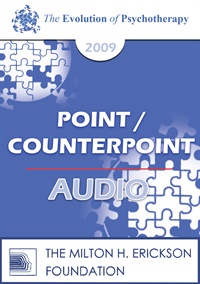
- Average Rating:
- Not yet rated
- Topic Areas:
- Point/Counterpoint Sessions | Narcissism | Personality Disorders | Psychotherapy
- Categories:
- Evolution of Psychotherapy | Evolution of Psychotherapy 2009
- Faculty:
- Otto Kernberg, MD
- Duration:
- 1 Hour 30 Minutes
- Format:
- Audio Only
- Original Program Date:
- Dec 09, 2009
- Short Description:
- Dr. Kernberg will present prognostically unfavorable indications for a psychodynamic psychotherapy of narcissistic patients, and the management of the corresponding difficulties. The description of general characteristics of narcissistic personality disorder, clinical syndromes including the diagnosis, and general principles of psychodynamic therapy for them will compliment this presentation.
- Price:
- $15.00 - Base Price
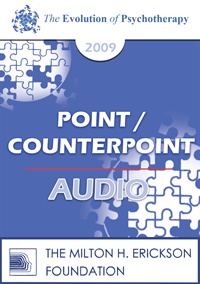
- Average Rating:
- Not yet rated
- Topic Areas:
- Point/Counterpoint Sessions | Life Focus Community | Psychotherapy | Religion
- Categories:
- Evolution of Psychotherapy | Evolution of Psychotherapy 2009
- Faculty:
- Erving Polster, PhD
- Duration:
- 1 Hour 28 Minutes
- Format:
- Audio Only
- Original Program Date:
- Dec 10, 2009
- Short Description:
- Psychotherapy, an originally private medical procedure, faces two immediate challenges: 1) an asocial pharmaceutical ethos and 2) its own populist success, which now call out for a more inclusive format. The latter represents a growing option for life-long large groups tapping the innermost sensibilities of people and creating the embodiment of belonging.
- Price:
- $15.00 - Base Price
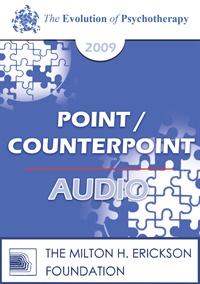
- Average Rating:
- Not yet rated
- Topic Areas:
- Point/Counterpoint Sessions | Psychotherapy | Genomics | Neuroscience
- Categories:
- Evolution of Psychotherapy | Evolution of Psychotherapy 2009
- Faculty:
- Ernest Rossi, PhD
- Duration:
- 1 Hour 3 Minutes
- Format:
- Audio Only
- Original Program Date:
- Dec 10, 2009
- Short Description:
- Revolutionary research in neuroscience and functional genomics documents show experiences of 1) Novelty, 2) Environmental Enrichment, and 3) Exercise (both mental and physical) can optimize gene expression, brain plasticity and mindbody healing during therapeutic hypnosis and meditation.
- Price:
- $15.00 - Base Price
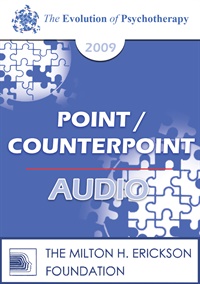
- Average Rating:
- Not yet rated
- Topic Areas:
- Point/Counterpoint Sessions | Social Issues | Psychotherapy
- Categories:
- Evolution of Psychotherapy | Evolution of Psychotherapy 2009
- Faculty:
- Albert Bandura
- Duration:
- 1 Hour 24 Minutes
- Format:
- Audio Only
- Original Program Date:
- Dec 10, 2009
- Short Description:
- This presentation addresses how otherwise good people can do cruel things. They do so through selective disengagement of moral self-sanctions from inhumane conduct. At the behavior locus, worthy ends are used to sanctify harmful means by social and moral justification. At the agency locus, people obscure personal responsibility by displacement and diffusion of responsibility. At the outcomes locus, the detrimental social effects of one’s actions are ignored, minimized, or disrupted. At the victim locus, perpetrators dehumanize and blame recipients for bringing the maltreatment on themselves. These mechanisms operate at both individual and social systems levels. Disengagement of moral agency is illustrated in the workings of the corporate world, terrorism, the use of military force, application of the death penalty, and in ecological destruction that is heating the planet and making it less habitable.
- Price:
- $15.00 - Base Price
Tags: Social Issues Psychotherapy
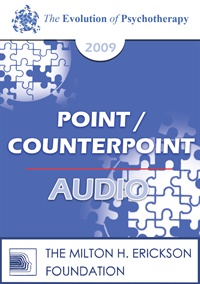
- Average Rating:
- Not yet rated
- Topic Areas:
- Point/Counterpoint Sessions | Psychotherapy | Therapist Development
- Categories:
- Evolution of Psychotherapy | Evolution of Psychotherapy 2009
- Faculty:
- David Barlow, PhD
- Duration:
- 1 Hour 33 Minutes
- Format:
- Audio Only
- Original Program Date:
- Dec 10, 2009
- Short Description:
- DSM-V will likely organize groups of disorders, including emotional disorders, along some as yet undecided dimensions. One possible scheme will be presented that collapses current DSM-IV emotional disorders into a single unified consideration of the dimensional severity of fundamental temperaments and key features shared, to some extent, by most emotional disorders with implications for psychological interventions.
- Price:
- $15.00 - Base Price
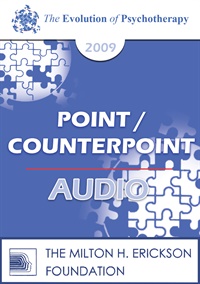
- Average Rating:
- Not yet rated
- Topic Areas:
- Point/Counterpoint Sessions | Art and Creativity | Psychotherapy | Therapist Development
- Categories:
- Evolution of Psychotherapy | Evolution of Psychotherapy 2009
- Faculty:
- Jeffrey Zeig, PhD
- Duration:
- 1 Hour 11 Minutes
- Format:
- Audio Only
- Original Program Date:
- Dec 12, 2009
- Short Description:
- Science measures, art impacts. We will study methods of impact used in various arts, including painting, music, writing, movies and dance. These methods can be applied in therapy where they can provide impact, making clinical work more experiential, more effective. A model will be offered and explained.
- Price:
- $15.00 - Base Price
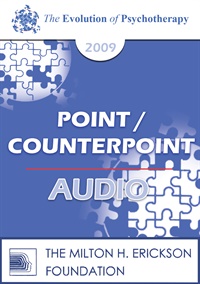
- Average Rating:
- Not yet rated
- Topic Areas:
- Point/Counterpoint Sessions | Suicide | Psychotherapy
- Categories:
- Evolution of Psychotherapy | Evolution of Psychotherapy 2009
- Faculty:
- James Hillman, PhD
- Duration:
- 1 Hour 23 Minutes
- Format:
- Audio Only
- Original Program Date:
- Dec 12, 2009
- Short Description:
- An expanded understanding of the suicidal urge, and reasoning, belongs to the capability of any therapist, since suicide is always a human potential. The therapist needs to come to terms with his/her own suicidal urges, fears and fantasies, and ideas of death as well. Objective reports – diagnosis, demographics, age groups, psychological situation, social history, personal styles, etc. may or may not help the practitioner in encountering the client’s risk of suicide.
- Price:
- $15.00 - Base Price
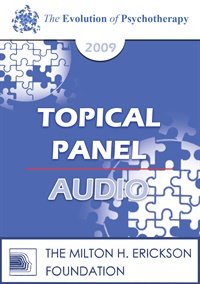
- Average Rating:
- Not yet rated
- Topic Areas:
- Topical Panels | Resistance | Psychotherapy
- Categories:
- Evolution of Psychotherapy | Evolution of Psychotherapy 2009
- Faculty:
- Stephen Gilligan, PhD | Jean Houston, PhD | Erving Polster, PhD
- Duration:
- 1 Hour 1 Minutes
- Format:
- Audio Only
- Original Program Date:
- Dec 11, 2009
- Short Description:
- EP09 Topical Panel 02 – Resistance – Stephen Gilligan, Jean Houston, and Erving Polster Educational Objective: To compare and contrast clinical and philosophical perspectives of experts.
- Price:
- $15.00 - Base Price
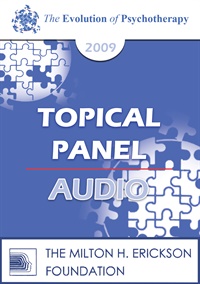
- Average Rating:
- Not yet rated
- Topic Areas:
- Psychotherapy | Topical Panels | History of Psychotherapy
- Categories:
- Evolution of Psychotherapy | Evolution of Psychotherapy 2009
- Faculty:
- Albert Bandura | Otto Kernberg, MD | Donald Meichenbaum, PhD
- Duration:
- 56 Minutes
- Format:
- Audio Only
- Original Program Date:
- Dec 11, 2009
- Short Description:
- EP09 Topical Panel 03 – History of Psychotherapy – Albert Bandura, Nicholas Cummings, Otto Kernberg, and Thomas Szasz Educational Objective: To compare and contrast clinical and philosophical perspectives of experts.
- Price:
- $15.00 - Base Price
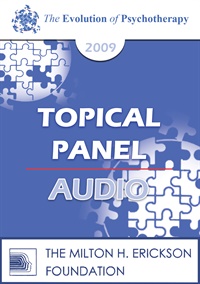
- Average Rating:
- Not yet rated
- Topic Areas:
- Psychotherapy | Topical Panels | Research
- Categories:
- Evolution of Psychotherapy | Evolution of Psychotherapy 2009
- Faculty:
- David Barlow, PhD | Steven Hayes, PhD | Scott Miller, PhD
- Duration:
- 1 Hour 2 Minutes
- Format:
- Audio Only
- Original Program Date:
- Dec 11, 2009
- Short Description:
- EP09 Topical Panel 04 – Research in Psychotherapy – David Barlow, Steven Hayes, and Scott Miller Educational Objective: To compare and contrast clinical and philosophical perspectives of experts
- Price:
- $15.00 - Base Price
Please wait ...

